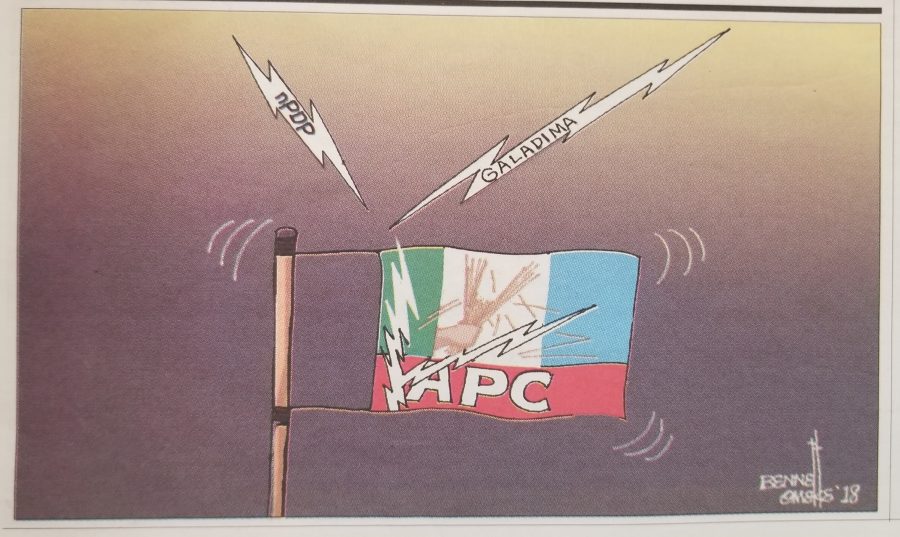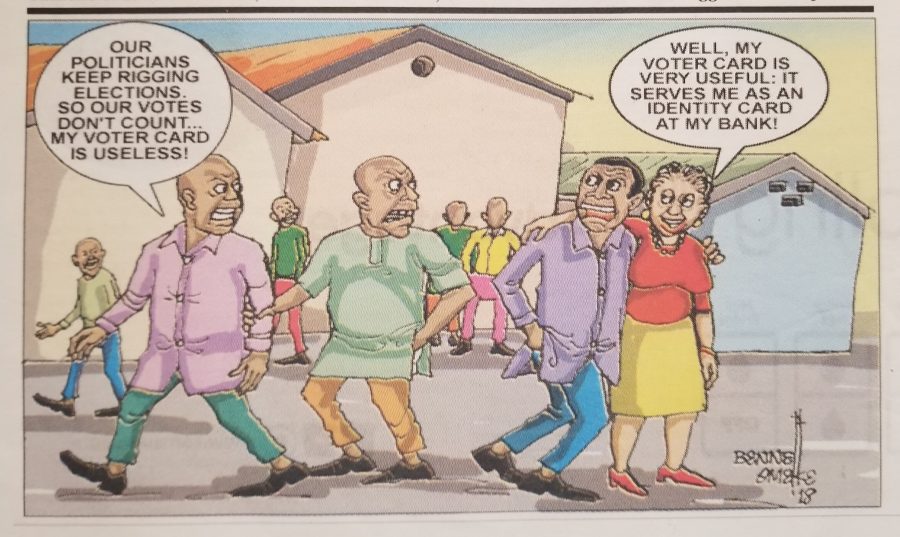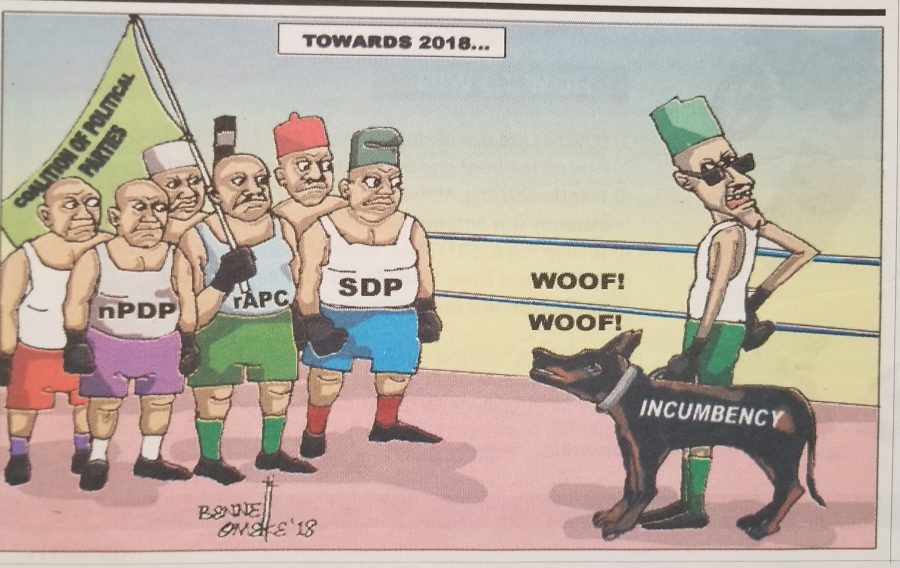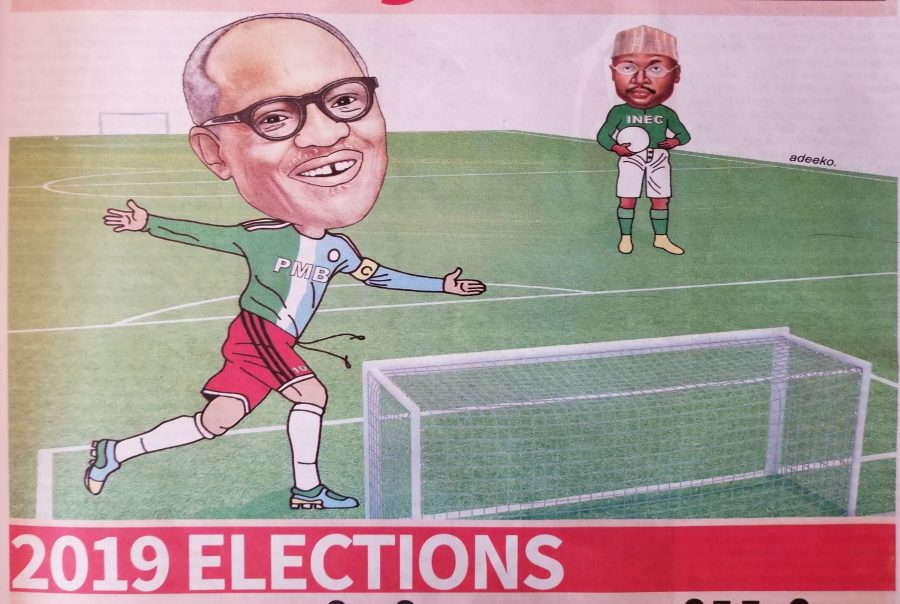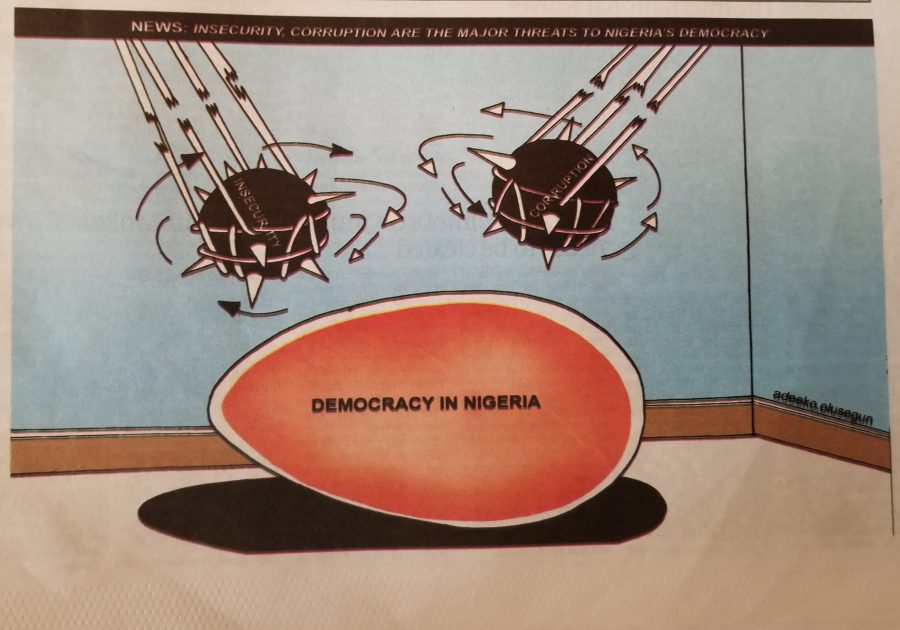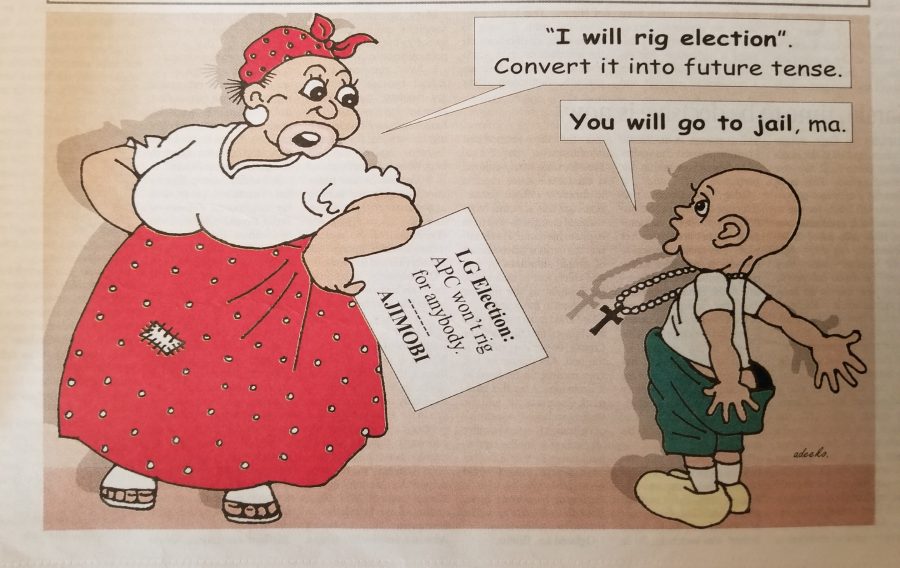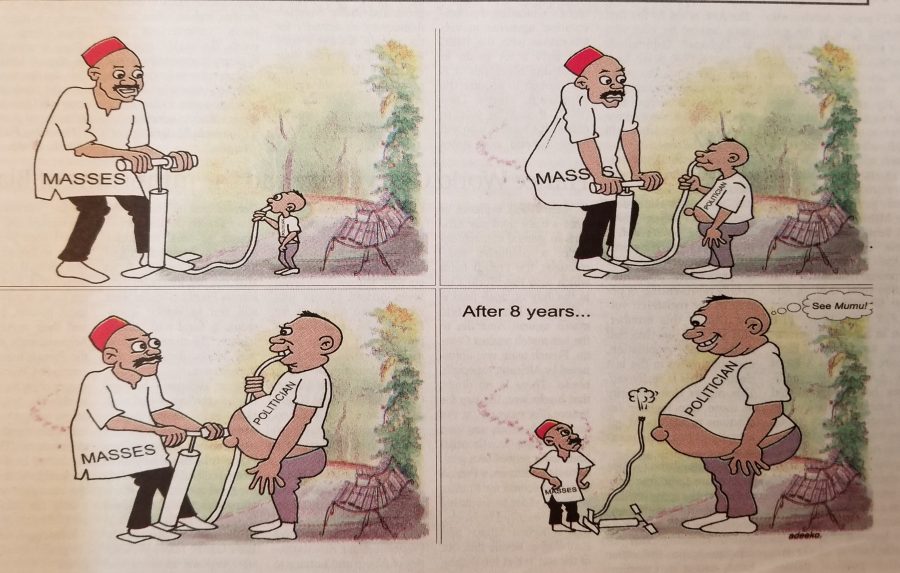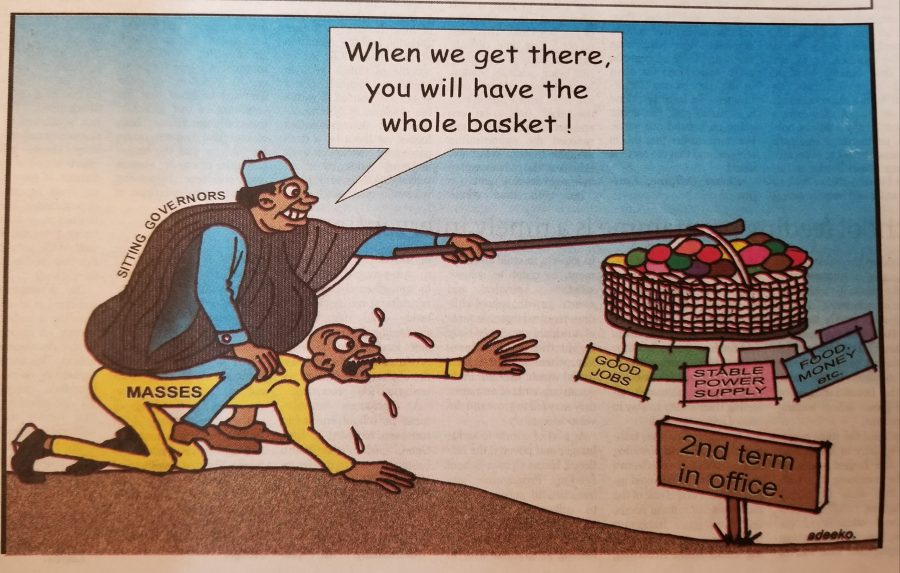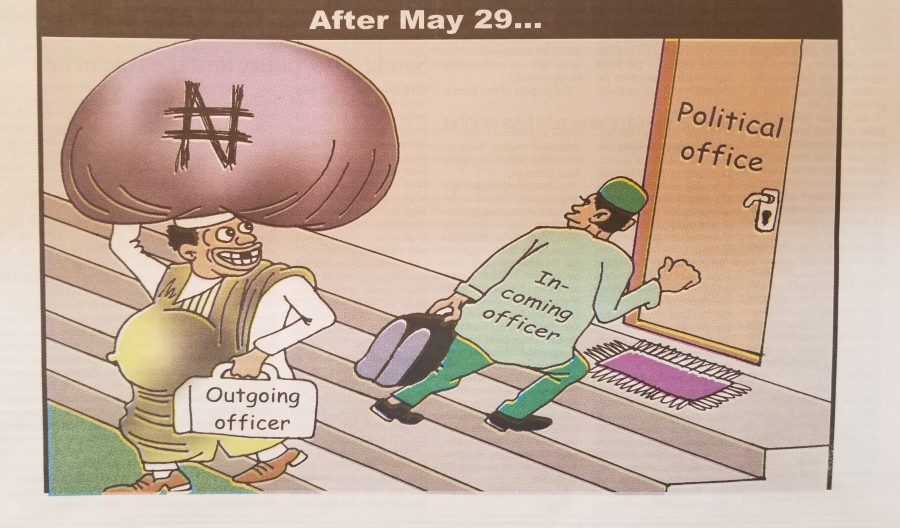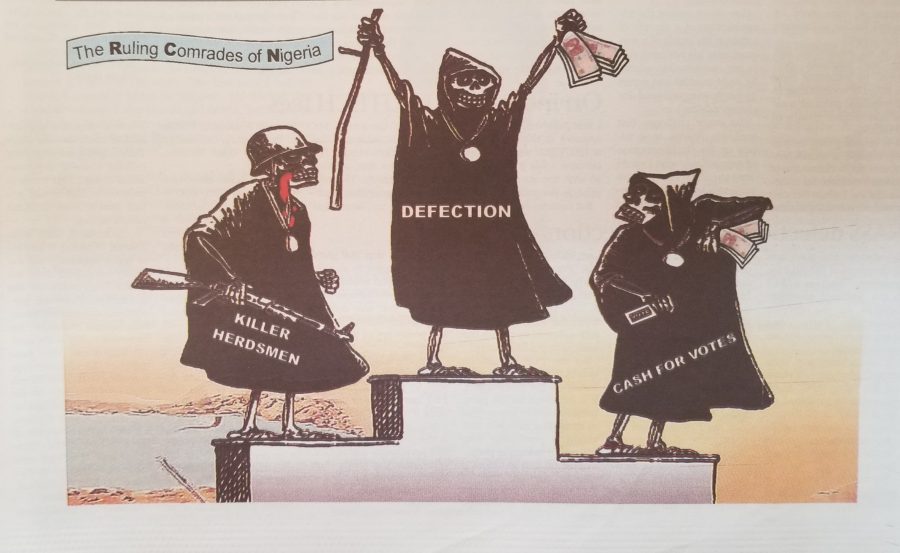Tag Archives: 2019
Bennet Omeke – Towards 2018…
In this cartoon, set in a boxing ring, a bunch of kitted and terrified men are gearing up to challenge the caricature of President Muhammadu Buhari who also happens to have a dog labeled “incumbency” beside him.
The terrified men are representatives of some political parties hoping to form a coalition. The nPDP: new People’s Democratic Party; rAPC: reformed All Progressives Congress; and the SDP: Social Democratic Party. Both nPDP and rAPC are not really political parties. They are just factions of the All Progressives Congress and the People’s Democratic Party.
One of the things that is really fascinating about this cartoon is the incumbent dog. The dog could be anything from state security agents, to the military, national commonwealth, etc. Just anything the incumbent administration can lay its hands on.
Adeeko Olusegun – 2019 Elections
This cartoon depicts President Muhammadu Buhari as the captain of a soccer team. He is seen close to the goal post. He is also putting on a jersey that has the color of his political party, the All Progressives Congress (APC). There is also a referee standing aloof. The referee wears a jersey with INEC, Independent National Electoral Commission, written on it. The referee seems to be the chairman of the national electoral body, Professor Mahmood Yakubu.
Because President Buhari is close to the goal post, this cartoon may be suggesting that he is the most prolific or bankable candidates in his political party. The distance between Buhari and the referee – INEC chairman – may be a commentary on his promise of and commitment to a free and fair election.
Adeeko Olusegun – Democracy in Nigeria
This cartoon by Adéẹk̀ọ́ Olùṣẹǵun of the Nigerian Tribune identifies some of the threats to democracy in Nigeria. Here, there are two thorny, guarded, and guided missiles targeted at an egg in a confined space. The egg represents of democracy in Nigeria.
Everything about Adéẹk̀ọ́’s depictions are symbolic. The choice of an egg signifies the fragility of Nigeria’s democracy. Its reddish color seems to suggest that democracy in the country has reached a boiling point, no thanks to the increased stories of corruption and insecurities that headline national news as the 2019 elections approach.
Adeeko Olusegun – I Will Rig Election…
In this cartoon, there is a woman and a boy talking. The woman finds a teachable moment in a statement made by Governor Abiola Ajimobi of Ọ̀yọ́ state. According to the governor, his political party, the All Progressives Congress (APC) “won’t rig [election] for anybody”.
The woman wants the child to practice his English language skills by asking him to convert “I will rig election” into future tense. The poor boy instead thinks the woman implies that she would rig election and he replies that she would go to jail.
In a way, this is a didactic cartoon. It seems to be teaching adults and young children about what should happen if someone takes part in fraudulent electoral activities.
Adeeko Olusegun – Masses after 8 Years
This cartoon, as one would expect, is funny. It is also tragic. Funny because it reveals how gullible Nigerian masses are. Tragic because it highlights the parasitic relationship between the masses and politicians in the country. Overall, the cartoon narrates an 8-year long story (“8 years” implies two terms in office.).
First, there is a red-capped man holding a bike pump that is inserted in the mouth of a tiny politician. This is the first encounter between both parties (the masses and politicians) and it reveals the dynamics of power relation between them. At the initial encounter, the masses seem to wield more power. This is probably the time when politicians canvass for votes. The choice of having a the man signifying the masses put on a red cap is also loaded with meanings. For one, it signifies respect. In some parts of Nigeria, only respected and highly important persons are traditionally permitted to use a red cap.
One can also see the progression of the politician from a tiny man to a big man.
The last picture in the cartoon is a reversal of the first. After 8 years, the politician has become huge – with a protruding belly (probably as a result of embezzling public wealth). The once respected man has also become a laughing stock, a mumu (Nigerian pidgin English word which means a dunce). Essentially, this cartoon reveals how deceptive Nigerian politicians are and how far they are willing to go to get what they want. Even the most respected individuals in the society become preys to their deceptions.
Adeeko Olusegun – The Ruling Comrades of Nigeria
An average Nigerian would probably tell you that the killer herdsmen are the toughest menace they know that is threatening the country’s democracy. In 2018 alone, there has been more stories of herdsmen wrecking havoc in wanton fashion accross the country.
Here, however, Adéẹk̀ọ́ Olùṣẹǵun thinks otherwise. He highlights the most pressing challenges in Nigeria. He calls them the Ruling Comrades of Nigeria. They are KILLER HERDSMEN, DEFECTION, CASH FOR VOTES. For one, his choice of the word “comrade” is quite significant for meaning. It shows that these challenges work hand in hand.
Perhaps the most symbolic feature of this piece lies in Adéẹk̀ọ́’s hierarchical arrangement of the comrades. He places them on a medal podium. Killer Herdsmen to the left, Defection at the center, and Cash for Votes to the right. Of the three, DEFECTION is the winner, followed by Killer Herdsmen with a raised platform and Cash for Votes as the last. Adéẹk̀ọ́ seems to be suggesting that the challenges of killer herdsmen and cash for votes are not as brutal and threatening as political defections.
It’s also instructive to point out the fact that only both election- or politics-related Defection and Cash for Votes involve money. This is not strange, money is a huge factor in Nigerian politics. Many politicians run for office because of the juicy remunerations that come with being a public office-holder. And people come out to cast their vote because of the hope of being paid by politicians.
It is also important to point out that both Killer Herdsmen and Cash for Votes look up to Defection. Overall, while these comrades are related, Adéẹk̀ọ́ believes defections among politicians is threatening the democracy of the country. It is in a class of its own.

